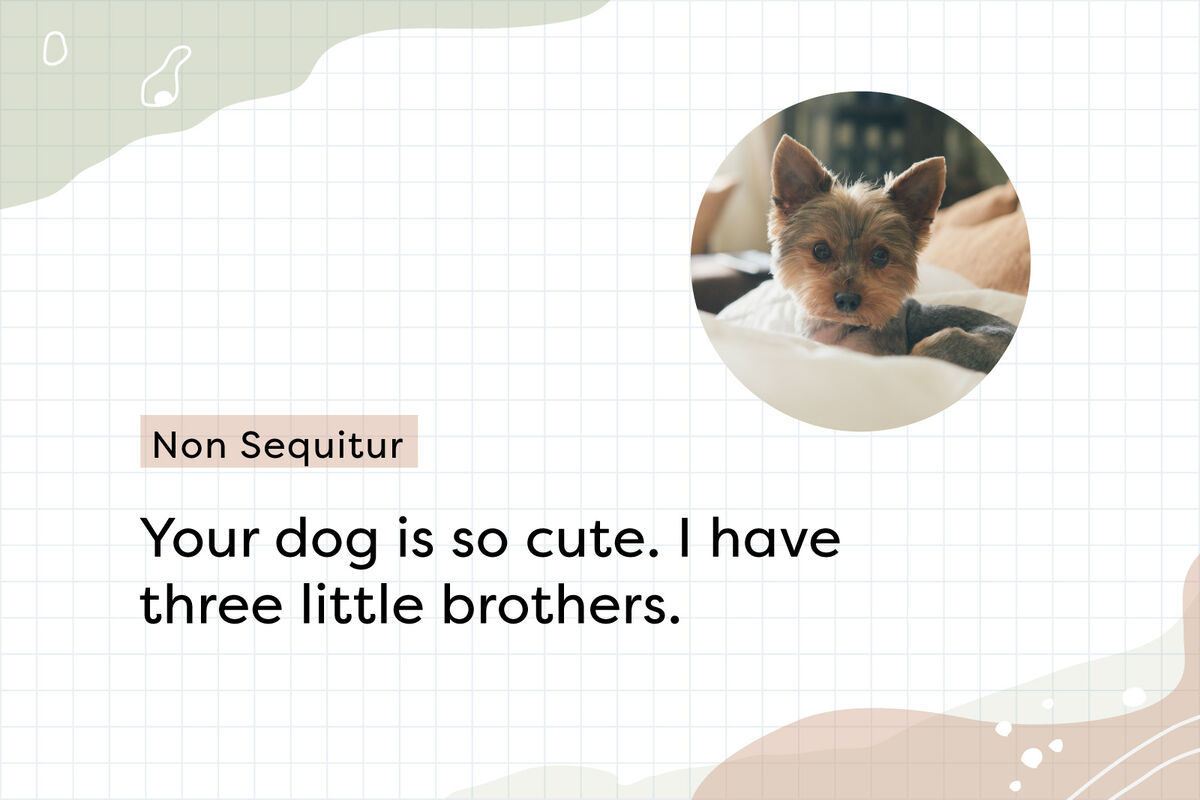
If someone asks what it's like outside and you reply, "It's 2:00," you've just used a non sequitur — a statement that does not follow what was being discussed. Non sequiturs are prevalent in everyday conversation and fallacious arguments, and are often effective in literature for both comedic and dramatic emphasis.
The Definition of Non Sequitur
The term non sequitur refers to a conclusion that isn't aligned with previous statements or evidence. In Latin, non sequitur literally means "it does not follow." Not only do non sequiturs fail to follow logic, but they're also usually untrue, having jumped to unfounded conclusions.
Everyday Non Sequitur Examples
In conversation, non sequiturs are statements that seem absurd, often causing confusion due to lack of understanding. They’re not random statements, but they don't follow a line of logic (or they are fallacious). They may reflect a gap or missing details in the speaker’s thought process.
Common non sequitur examples include:
My refrigerator is acting up. I’d better finish that book by Friday.
It's time to take my car in for service. I wonder if my stylist is available this Saturday.
Mary bakes the best cakes in town. She should run for mayor.
I got sick after eating sushi last week. Pizza is the best.
Your dog is so cute. I have three little brothers.
It’s really nice to meet you. What’s your shoe size?
You know Spanish? What does “Comment t'appelles-tu?” mean in French?
I can’t go to your graduation party. These cookies are so expensive.
How old do you have to be to ride this roller coaster? My favorite color is blue.
You’re growing up so fast. I used to live in this neighborhood.
Examples of Non Sequitur Fallacy
Many formal logical fallacies are types of non sequiturs, such as “Affirming the Consequent” (“If you're a good person, then I’m a good person. Since you are a good person, therefore, I'm a good person.”) or “Denying the Antecedent” (“If I'm an adult, then I'm intelligent. I'm not an adult. Therefore, I'm not intelligent.”). They defy the basic rules of reason and are usually based upon unsound arguments.
Examples of fallacious non sequitur statements include:
If Jo loves to read, she must hate movies. Jo hates to read, so she must love movies.
When it's sunny, I see my neighbor walking his dog. He must only walk the dog when the sun is out.
Pierre is very talented. All musicians are talented. Therefore, Pierre is a musician.
We don’t like to hire plumbers because we’re from Alaska.
People who eat eggplant are healthy. I’m not healthy, so that means I don’t eat eggplant.
People who don’t study will fail the test. Mira failed the test, so therefore, she didn’t study.
A pit bull attacked someone in the news. My neighbor owns a chihuahua. My life is in danger.
All people can see. Eyes help you to see. Therefore, all people who have eyes can see.
Literary Non Sequitur Examples
Non sequiturs are often used for comedic and dramatic purposes in literature. These far-fetched statements can catch people off guard, surprising a laugh (or a shock) out of them.
“It was a spring day, the sort that gives people hope: all soft winds and delicate smells of warm earth. Suicide weather.” - Girl, Interrupted, Susanna Kaysen
“‘I love you,’ she said. She nestled closer, her hand moving up the back of his neck. The wind lifted. ‘Don't kill me,’ he said. ‘I'm not going to,’ she said.” - Lexicon, Max Barry
“Beetroot Cossins had moved to Kuala Lumpur where she died of lethargy and pie.” - The Bizarre Letters of St. John Morris, St. John Morris
“‘You should learn not to make personal remarks,’ Alice said with some severity. ‘It's very rude.’ The Hatter opened his eyes very wide on hearing this; but all he said was, ‘Why is a raven like a writing-desk?’” - Alice’s Adventures in Wonderland, Lewis Carroll
“Let's say no more about it. Up pig! Every time he drops he falls asleep. Up hog! Back! Stop! Turn! Gentlemen, I am happy to have met you. Yes yes, sincerely happy. Closer! Stop! Yes, the road seems long when one journeys all alone for … yes … yes, six hours, that's right, six hours on end, and never a soul in sight. Coat!” - Waiting for Godot, Samuel Beckett
“‘You’re crazy,’ Clevinger shouted vehemently, his eyes filling with tears. ‘You’ve got a Jehovah complex.’
‘I think everyone is Nathaniel.’
Clevinger arrested himself in mid-declamation, suspiciously. ‘Who’s Nathaniel?’
‘Nathaniel who?’ inquired Yossarian innocently.” - Catch 22, Joseph Heller“Cashier: Hello, how are you this evening?
Me: Has your house ever been burgled?
Cashier: What?
Me: Your house — has anyone ever broken into it and stolen things?” - Calypso, David Sedaris
Serving a Dual Purpose
Non sequiturs can be confusing in conversation and formal writing, but quite effective in literature. For more information on logical fallacies, check out: